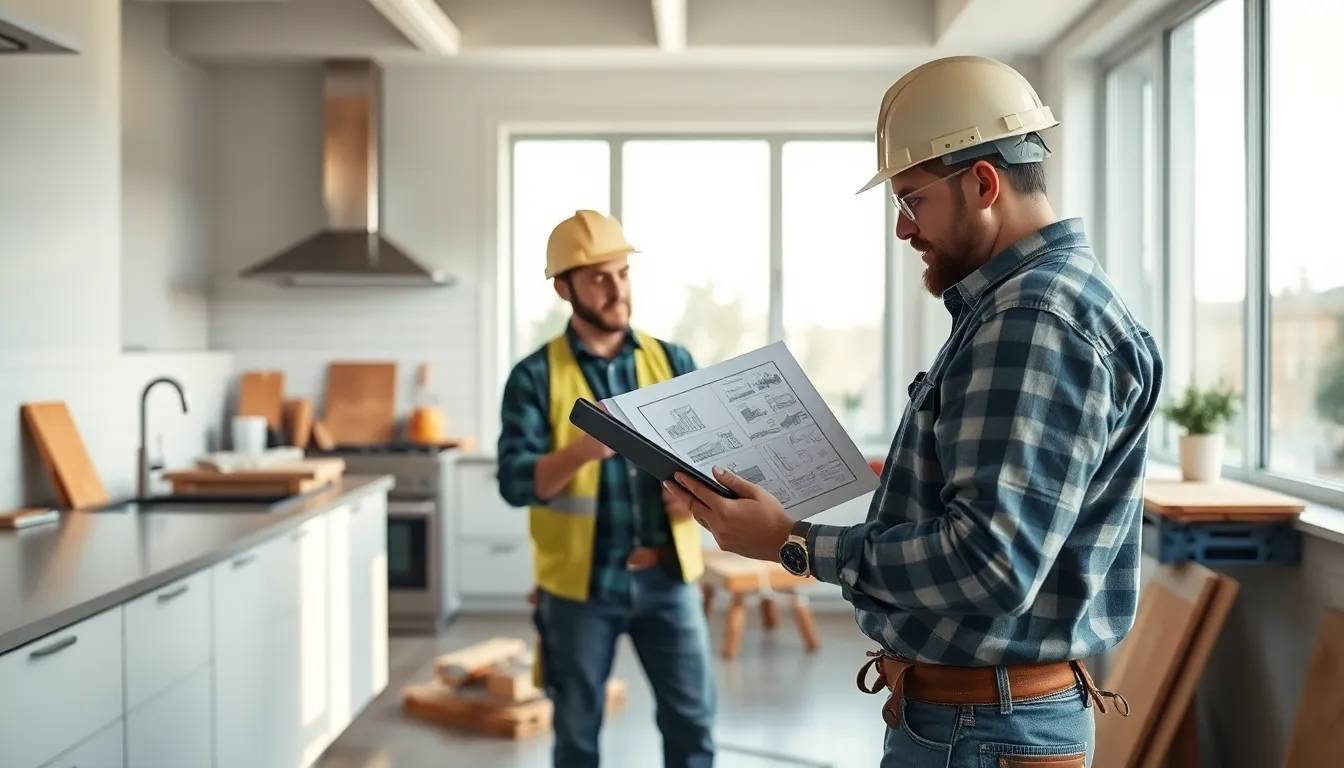Imagine walking into your home and feeling like you’ve stepped into a Pinterest board come to life. With AI home renovation, that dream isn’t just a fantasy; it’s a reality waiting to unfold. Gone are the days of flipping through endless magazines or arguing with your partner over paint colors. Now, technology does the heavy lifting, transforming your space with the precision of a seasoned designer and the creativity of a caffeinated artist.
Table of Contents
ToggleOverview of AI Home Renovation
AI revolutionizes home renovation by integrating advanced technology into the design process. This innovative approach enables homeowners to visualize their spaces in ways that traditional methods cannot. Tools powered by AI analyze room dimensions, lighting, and personal tastes to offer tailored design recommendations.
Homeowners access virtual simulations that showcase potential design outcomes before making commitments. These simulations help in selecting materials, colors, and layouts that suit individual preferences. AI-driven platforms simplify decision-making, minimizing anxiety over renovation choices.
Moreover, algorithms suggest optimal design configurations based on similar successful projects. They provide insights into trends, ensuring renovations remain stylish and relevant. Using data from previous renovations, AI tools can predict potential costs, allowing for precise budgeting.
Feedback mechanisms within these platforms fine-tune design proposals, leading to increasingly refined outcomes. Users engage interactively, sharing visions and desires, while AI captures feedback for continuous improvement. Unique design styles emerge through personalized suggestions that reflect users’ tastes.
By automating routine tasks, AI saves time, allowing designers to focus on creativity. Insights gleaned from patterns in user choices enhance future renovations, leading to continuous evolution in design preferences. AI is designed to optimize home transformations, creating spaces that are functional as well as aesthetically pleasing.
This blend of technology and creativity promises to enhance home environments while streamlining the renovation experience. Through AI, homeowners achieve results that might once have required significant time and effort. Each project benefits from enhanced visualization and informed decision-making, ultimately leading to a smoother renovation process.
Benefits of AI in Home Renovation

AI brings numerous advantages to home renovation, improving both the design process and overall experience.
Cost Savings
Reduced expenses manifest through AI’s ability to analyze data and suggest cost-effective materials and designs. Homeowners gain insights into budgeting, which helps avoid overspending. Platforms provide a comparison of various materials and options, leading to smarter purchasing decisions. Forecasting tools signal potential expenses, enabling better financial planning. By predicting future costs based on past projects, homeowners can make informed decisions that stay within budget.
Time Efficiency
Renovation timelines shrink significantly when employing AI tools. Automation of routine tasks streamlines workflows, allowing designers to focus on creative aspects. Visualization capabilities enable quick adjustments to design plans, speeding up the decision-making process. Real-time feedback systems facilitate rapid responses to changes, reducing waiting periods. Overall, AI accelerates project timelines, fostering quicker completion of renovations, which enhances homeowner satisfaction.
Popular AI Tools for Home Renovation
AI tools revolutionize home renovation by optimizing design choices and managing project workflows. They enhance the user experience, making renovation engaging and efficient.
Design Visualization Software
Design visualization software empowers homeowners to see their ideas come to life. Programs like SketchUp and RoomGPT allow users to create 3D models of their spaces, helping them visualize layouts and styles. These tools analyze room dimensions and lighting, ensuring that recommendations align with personal tastes. Users can easily experiment with colors and materials, making informed decisions without the pressure of traditional methods. Moreover, some software integrates augmented reality features, enabling users to view designs in real-time within their own homes.
Project Management Applications
Project management applications streamline the renovation process from start to finish. Tools like Trello and Asana help track tasks, deadlines, and budgets. Users can visualize project timelines, breaking renovations into manageable steps. These platforms enable collaboration among contractors, designers, and homeowners, reducing miscommunication. Additionally, many applications offer mobile access, allowing users to make updates on the go. They also generate cost estimates based on inputs, ensuring financial planning aligns with expectations. By consolidating communication and organization, project management tools enhance the overall renovation experience.
Challenges of Implementing AI in Renovation
Implementing AI in home renovation presents several challenges that stakeholders must navigate. Understanding these challenges is crucial for a successful integration of AI technology.
Technical Limitations
Technical limitations often hinder AI’s effectiveness in home renovation. Some AI systems may struggle with accurately interpreting complex spaces and unique architectural designs. Data availability remains a significant issue; without comprehensive datasets, AI lacks the ability to learn from diverse renovation scenarios. Furthermore, the integration of AI tools with existing software systems can lead to compatibility problems, complicating workflows. These issues can diminish the overall user experience, making it essential for developers to enhance AI algorithms continuously.
Adoption Barriers
Adoption barriers can significantly impact the use of AI in home renovation. Resistance from professionals is common due to concerns about job displacement and reliance on technology. Many homeowners may feel intimidated by AI tools, perceiving them as too complex or requiring advanced technical skills. Financial constraints also play a role; the cost of implementing AI technology may deter some from pursuing these innovations. Ensuring that training and support are available can help alleviate these concerns and encourage wider adoption.
Future Trends in AI Home Renovation
AI home renovation is set to advance significantly, influencing various aspects of design and execution. Enhanced design tools enable homeowners to simulate renovations in real-time, allowing for quick adjustments and visualizations. Automated material sourcing will also streamline the procurement process, providing recommendations based on budget and style preferences.
Personalization remains a key trend. AI algorithms analyze previous projects and user preferences to create tailored space designs. Predictive analytics will offer insights into future design trends, ensuring renovations are modern and appealing.
Integration with smart home technology enhances the renovation experience. Homeowners can seamlessly merge design elements with smart devices, creating environments that foster convenience and energy efficiency. This convergence will simplify control over lighting, climate, and security through a cohesive design approach.
Collaboration tools will further improve project management. Enhanced platforms will facilitate communication, connecting homeowners, designers, and contractors. Such improvements will ensure everyone involved stays informed, aligning visions and expectations throughout the renovation.
Cost-effectiveness continues to be a focus. AI-driven software will predict project expenses more accurately, guiding homeowners in budget decisions. Cost-saving material suggestions based on data-driven insights will empower decision-making, reducing waste and improving sustainable practices.
Ease of use is crucial as AI tools become more user-friendly. Simplified interfaces will lower barriers to entry, inviting more homeowners to embrace the technology. Increased accessibility will encourage widespread adoption, transforming even the most complex renovations into manageable projects.
Expanded capabilities of AI in renovation platforms will include virtual reality experiences. Immersive environments will allow homeowners to “walk through” designs before commitment, enhancing confidence in their choices. These advancements signify a transformative shift in how people conceive and execute home renovation projects.
AI’s impact on home renovation is undeniable. By merging technology with design, it empowers homeowners to create personalized spaces that reflect their unique tastes. The convenience of virtual simulations and tailored recommendations simplifies decision-making, making renovations less daunting.
As AI tools continue to evolve, they promise to enhance efficiency and creativity in home projects. The future holds exciting possibilities with real-time simulations and improved collaboration among homeowners and professionals. Embracing AI in home renovation not only streamlines the process but also ensures that every project is both stylish and cost-effective. Homeowners can look forward to a renovation experience that’s not just easier but also more enjoyable.






